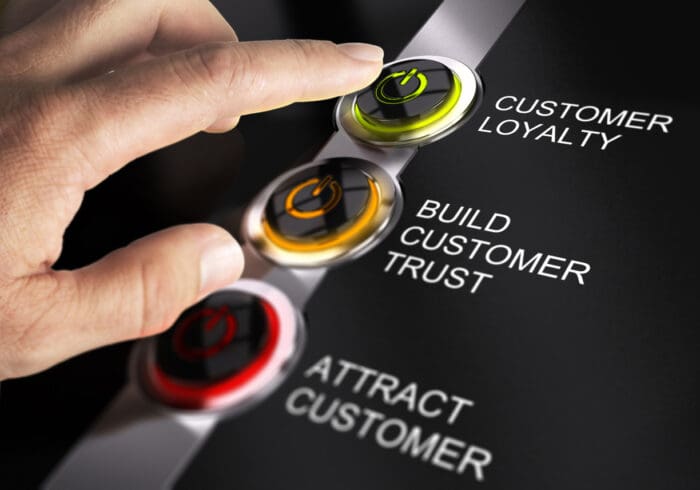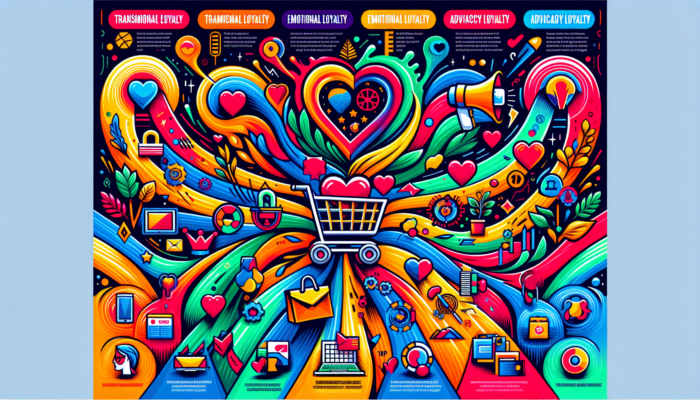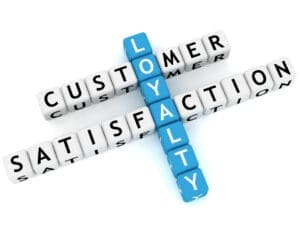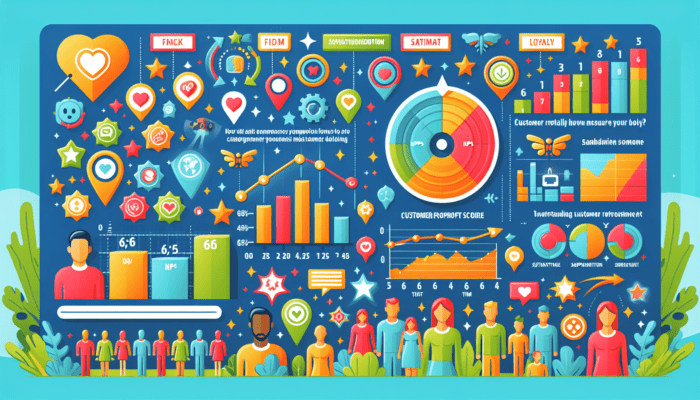Are you wondering how customer loyalty impacts your business? Knowing the different types of customer loyalty can make a huge difference. Each type shows why customers stick with a brand, from emotional to habitual loyalty. In this article, we’ll break down the seven main types of customer loyalty and explain their importance. Additionally, understanding the various types of loyal customers can help businesses tailor their strategies and enhance customer experience.
- Customer loyalty is essential for sustainable business growth, encompassing repeat purchases and a commitment to the brand.
- Recognizing various types of customer loyalty—transactional, emotional, engagement, behavioral, advocacy, social, and habitual—allows businesses to tailor strategies effectively.
- Building strong customer loyalty involves gathering feedback, personalizing experiences, and implementing an effective loyalty program to enhance relationships and foster advocacy.
- Integrating marketing campaigns within customer loyalty strategies can significantly enhance engagement and loyalty. Tailored marketing campaigns encourage desired customer behavior and ensure relevant content, increasing effectiveness.
Understanding Customer Loyalty

Customer loyalty is more than just a buzzword; it is the backbone of profitable and sustainable business growth. Customer loyalty fundamentally involves giving a company repeat business. This ongoing commitment is a reward and signifies a long-term investment in the brand, reflecting both actions and attitudes.
Loyal customers are invaluable. They make frequent purchases, contribute significantly to revenue, and provide constructive feedback that can be used to enhance products and services. Moreover, truly loyal customers think of the brand first when their needs arise, establishing trust and credibility. Happy customers are satisfied with the brand's products or services, leading to repeat purchases and brand loyalty.
Cultivating customer loyalty requires ongoing effort but offers numerous benefits. Companies with loyal customers should better resist competition, as these customers are less likely to switch brands. Implementing a customer loyalty program can significantly enhance customer retention and engagement by fostering stronger connections through personalized communication and tangible rewards. A high level of customer loyalty also fosters a positive work environment, as customer loyalty is important, and employees take pride in serving devoted customers. Additionally, leveraging truly loyal customers can help acquire customers through highly effective word-of-mouth marketing.
Understanding and nurturing different types of loyalty is essential for businesses to build lasting customer relationships.
Characteristics of Loyal Customers
Loyal customers are the backbone of any successful business, and understanding their characteristics is crucial for developing effective customer loyalty programs. These customers consistently make repeat purchases and are likelier to continue buying from a brand they trust. Competitors do not easily sway them, and they are willing to pay a premium for products or services they love.
Loyal customers engage with a brand on various channels, such as social media, email, and in-store, providing valuable feedback that helps improve the customer experience. Their willingness to recommend a brand to friends and family generates positive word-of-mouth referrals, further enhancing its reputation.
Moreover, loyal customers have a high lifetime value, making them valuable assets to any business. Their consistent support and advocacy contribute significantly to a company’s long-term success.
Top 7 Types of Customer Loyalty

Customer loyalty is defined by a customer’s regular purchases and preference for a brand over others. However, loyalty isn’t one-size-fits-all. There are seven primary types of customer loyalty: transactional, emotional, engagement, behavioral, advocacy, social, and habitual loyalty. Each type represents a unique way customers connect with and commit to a brand.
Recognizing these types allows businesses to tailor their strategies to meet diverse customer needs. Each type plays a role in building a loyal customer base. Understanding the customer journey is crucial in identifying and enhancing these different types of loyalty.
Transactional Loyalty
Transactional loyalty is perhaps the most straightforward type of loyalty. It is based on repeat purchases, often incentivized by rewards or discounts. Customers who exhibit transactional loyalty are primarily motivated by price and deals rather than the quality of service. For instance, a loyalty program offering points for every purchase, redeemable for discounts, exemplifies transactional loyalty.
However, transactional loyalty poses challenges. Customers may leave for better deals, making retention difficult. The focus on low prices can also overshadow the importance of building a deeper connection with customers.
Despite these challenges, transactional loyalty remains a key component of many successful loyalty programs.
Emotional Loyalty
Emotional loyalty is a deep connection between a customer and a brand, built through trust and meaningful engagement. This type of loyalty goes beyond mere transactions; it is characterized by personal connections that make customers feel valued and appreciated. For instance, a customer who feels a personal connection with a brand because it aligns with their values or provides exceptional service exemplifies emotional loyalty.
Emotionally loyal customers remain loyal even when faced with competitors’ offerings. This loyalty relies heavily on personalizing the customer experience, making customers feel valued, and inspiring greater brand loyalty.
Engagement Loyalty
Engagement loyalty is driven by customer engagement and interactions with a brand through various channels, fostering deeper relationships. Active customer involvement and targeted content can significantly influence engagement and loyalty. For example, businesses can use gamification techniques such as leaderboards and prize draws to drive engagement and loyalty.
Sustaining engagement loyalty requires monitoring customer interactions and offering personalized incentives. An effective loyalty program helps customers climb the loyalty ladder, deepening their engagement with the brand. Community engagement within loyalty programs can also create a heightened sense of belonging and participation.
Behavioral Loyalty
Repeat purchases from a specific brand characterize behavioral loyalty and are significantly influenced by customer spending. This type of loyalty involves tracking customer actions through incentives. For example, a company might use rewards programs and discounts to influence customer behavior and encourage repeat purchases.
Behavioral loyalty emphasizes tracking and influencing customer actions through rewards. Businesses can leverage data science and machine learning to analyze behaviors and tailor strategies. However, customers motivated purely by rewards may not exhibit full brand loyalty.
Advocacy Loyalty
Advocacy loyalty arises when customers promote a brand to others, enhancing word-of-mouth referrals. These brand ambassadors are devoted to the brand, regularly buy, and contribute significantly to profits. For example, customers with positive social media experiences will likely recommend the brand to others.
Advocacy loyalty turns customers into brand advocates. These loyal customers attract new ones through word-of-mouth referrals, making this loyalty type highly valuable.
Excellent customer service fosters advocacy loyalty, as satisfied customers are more likely to promote the brand.
Social Loyalty
Social loyalty is influenced by customers’ social circles and their online brand promotions. Incentives that strengthen social loyalty include discounts or freebies for customer reviews. For instance, businesses can reward customers with VIP tokens and exclusive discounts to promote the brand on social media.
Encouraging customers interested in the brand to share their experiences enhances social loyalty by engaging their social circles. Social loyalty can be cultivated by rewarding customers for sharing their experiences and recommendations, and maintaining customer interest and engagement.
Habitual Loyalty
Habitual loyalty occurs when convenience customers consistently buy from a brand out of convenience rather than a strong brand attachment. These customers are motivated by convenience rather than price. For example, customers might continue buying from a particular grocery store because it is the closest to their home.
These repeat customers are willing to pay more for convenience. Habitual loyalty ensures consistent sales, even without a strong emotional connection to the brand.
Benefits of Customer Loyalty
Customer loyalty is essential for businesses, and loyal customers spend 67% more than new customers, offering numerous benefits. Some of the most significant advantages of customer loyalty include:
Increased Word-of-Mouth Referrals
Loyal customers are more likely to recommend a company to friends and family, resulting in positive word-of-mouth referrals and more customers. According to a study, 71% of customers with a positive social media experience will recommend the brand to others.
Word-of-mouth is quite the customer acquisition machine, with over 84% of customers trusting referrals from friends and family over traditional ads. This organic promotion brings in new customers and enhances the brand’s credibility and trustworthiness.
Genuine Opinions and Feedback
Loyal customers are more open to giving feedback and are a vital source of information for companies looking to improve their products and services. By listening to their opinions and concerns, businesses can identify areas for improvement and make data-driven decisions to enhance customer satisfaction. This feedback loop is invaluable, as it helps companies stay attuned to customer needs and preferences, ultimately leading to better products and services.
Protection from Competitors
When you have customer loyalty, you don't have to keep lowering your prices to keep pace with your competitors, as customers will naturally choose your brand. Loyal customers are less likely to be influenced by competitor products, even if they offer cheaper prices.
This means businesses can focus on providing high-quality products and services rather than engaging in price wars. This competition protection allows companies to maintain their pricing strategies and invest in long-term growth initiatives.
Building Strong Customer Loyalty

Developing strong customer loyalty demands a multifaceted approach to build customer loyalty. Loyal customers help businesses navigate market fluctuations and achieve long-term success. Focusing on deeper types of loyalty is crucial for future success.
Key strategies for building strong customer loyalty include gathering customer feedback, personalizing the customer experience, and implementing effective loyalty programs. Marketing campaigns can be tailored to encourage desired customer behavior and enhance engagement and loyalty.
A customer loyalty program can also be a strategic approach to build loyalty and improve customer retention and engagement. These strategies help retain customers and attract new ones through positive word-of-mouth and reviews.
Gathering Customer Feedback
Collecting customer feedback is vital for understanding their needs and satisfaction. Surveys and direct interactions help identify areas for improvement and reduce churn risk. For example, alternative surveying methods like phone or text messages can reach customers who do not respond to traditional surveys.
Regular communication with customers can boost retention and enhance loyalty. Understanding which customers fall into different categories of loyalty can further refine these efforts. The Net Promoter Score (NPS) is a valuable metric for measuring loyalty and satisfaction. Timely responses to feedback build customer trust and enhance retention.
Personalizing Customer Experience
Personalizing the customer experience is key to building emotional loyalty. Loyal customers often favor a particular brand, not just for repeat purchases but also due to emotional connections and brand advocacy. With 83% of consumers seeking personalized promotions, tailored service is in high demand. Documenting customer data and interactions allows companies to meet individual needs effectively.
Instant, personalized rewards alongside excellent service strengthen emotional connections with customers. An omnichannel experience ensures consistent satisfaction across all platforms, deepening the brand relationship.
Implementing Effective Loyalty Programs
Effective loyalty programs, especially the best customer loyalty programs, deliver real value and cater to various customer needs. Segmenting customers into groups based on their needs is a key feature of successful programs. For example, developing a points-based loyalty program with customized rewards can be a strategic choice for retaining customers.
A customer loyalty program can be tailored to meet customer needs and enhance engagement through personalized communication and tangible rewards.
Loyalty programs can offer various rewards, such as points, discounts, and free products tailored to preferences. Combining rewards with customer loyalty and referral programs incentivizes customer advocacy and boosts engagement.
Challenges in Building Loyalty
Building customer loyalty is a challenging task, and businesses often face several obstacles in their efforts to retain customers. One of the primary challenges is the high customer acquisition costs, which can make it difficult to invest in loyalty programs. Balancing transactional loyalty with emotional loyalty is also crucial, as customers who are only loyal to a brand for its prices or rewards may not be as valuable as those with an emotional connection.
Providing excellent customer service is essential, but it can be time-consuming and resource-intensive. Businesses must also stay ahead of the competition and continuously innovate to keep customers engaged. Additionally, measuring customer loyalty and tracking the effectiveness of loyalty programs can be challenging, requiring businesses to invest in the right tools and metrics.
Creating a Loyal Customer Base
Creating a loyal customer base requires a strategic approach to building strong customer relationships. Here are some ways to create a loyal customer base:
Make Things Easy for Customers
Creating a flawless product or service perfectly meets customers’ needs is unnecessary. However, it’s essential to provide a good user experience that makes the purchasing decision a no-brainer for customers.
Businesses can reduce friction and increase the chances of repeat business by making things easy for customers. Empowering the customer service team to connect personally, along with intuitive website design, streamlined checkout processes, and responsive customer service, can significantly enhance customer trust and foster deeper emotional bonds. Customers who find it easy to interact with your brand are more likely to return and become loyal customers.
Measuring Customer Loyalty

Analyzing behavior and specific metrics is essential for assessing customer loyalty, effectiveness, and areas needing improvement. Customer rewards, churn, retention, and Net Promoter Score (NPS) are key metrics for measuring loyalty. These metrics help businesses understand how well they retain customers and where to improve.
Analyzing these metrics reveals their contribution to measuring customer loyalty.
Net Promoter Score (NPS)
Net Promoter Score (NPS) measures customer loyalty based on their likelihood to recommend a brand. NPS is calculated by subtracting the percentage of detractors from the percentage of promoters. This simple yet powerful metric helps assess customer loyalty by analyzing the willingness of customers to recommend the brand to others.
By asking customers, “How likely are you to recommend our business?” businesses can gauge loyalty and identify areas for improvement within their target audience. NPS is a valuable tool for understanding customer sentiment and driving loyalty initiatives.
Customer Retention Rate
The customer retention rate indicates how many of the most loyal customers remain loyal over a designated period. It measures retention within a specific time frame. This metric is crucial for businesses, indicating their success in retaining customers. Retaining existing customers is highly beneficial, as acquiring new ones costs 25 times more than retention.
Satisfied customers typically spend 140% more, making retention a crucial profitability driver for customer lifetime value. Monitoring retention rates helps identify areas for improvement and implement strategies to retain customers and enhance loyalty.
Customer Churn Rate
The customer churn rate shows the percentage of customers who have stopped buying a product or using a service. Although competitors can still lure customers interested in a brand, understanding and reducing churn is vital for maintaining loyalty.
A loyal customer base cuts marketing costs, as satisfied customers often promote the brand through word-of-mouth. Tracking churn rates helps identify at-risk customers and take steps to retain them, ultimately reducing customer acquisition costs.
Technology and Loyalty
Technology plays a crucial role in building and maintaining customer loyalty, and businesses can leverage various tools and platforms to enhance their loyalty programs. Using data and analytics to understand customer behavior and preferences allows companies to tailor their loyalty programs accordingly. Implementing loyalty software helps track customer interactions and reward loyal customers effectively.
Social media and email marketing are powerful tools for engaging customers and promoting loyalty programs. Personalized experiences and rewards through mobile apps and digital channels can significantly enhance customer satisfaction. Additionally, artificial intelligence and machine learning can predict customer behavior and prevent churn, ensuring businesses retain their most valuable customers.
Future of Customer Loyalty
The future of customer loyalty is likely to be shaped by several trends and technologies. Emotional loyalty and building strong relationships with customers will become increasingly important. Businesses must leverage artificial intelligence and machine learning to personalize loyalty programs and predict customer behavior.
The growth of mobile and digital channels will necessitate a strong online presence for businesses. Sustainability and social responsibility will also be crucial in building customer loyalty, as customers increasingly prioritize these values. Transparency and honesty in customer dealings will maintain trust and loyalty.
Real-World Examples
Many real-world examples of businesses have successfully built customer loyalty through effective loyalty programs and strategies. Amazon’s Prime loyalty program offers customers a range of benefits and rewards for a monthly fee, enhancing customer retention and engagement. Starbucks’ Rewards program uses mobile technology to track customer purchases and offer personalized rewards, fostering deeper customer connections.
Sephora’s Beauty Insider program provides customers with rewards and exclusive benefits for loyalty and engagement, creating a strong sense of community. Walmart’s Savings Catcher program helps customers save money and earn rewards through a mobile app, encouraging repeat purchases. Domino’s Pizza’s Piece of the Pie Rewards program rewards customers for online orders and offers exclusive benefits, driving customer loyalty and satisfaction.
These examples illustrate the effectiveness of well-designed loyalty programs in building and maintaining customer loyalty.
Summary
In summary, understanding and cultivating different types of customer loyalty is essential for long-term business success. From transactional to habitual loyalty, each type plays a unique role in building a loyal customer base.
Businesses can enhance customer engagement, retention, and profitability by gathering customer feedback, personalizing experiences, and implementing effective loyalty programs. Remember, loyal customers are the cornerstone of sustainable growth.

Frequently Asked Questions About Customer Loyalty
What is customer loyalty?
Customer loyalty is crucial as it represents ongoing support for a brand through repeat purchases, showcasing a lasting commitment. Embrace this loyalty to build stronger customer relationships and drive your success!
Why is customer loyalty important?
Customer loyalty is crucial as it boosts profits, strengthens your brand against competition, and fosters deeper connections with your customers. Cultivating loyalty can genuinely transform your business success!
What are the different types of customer loyalty?
Understanding the different types of customer loyalty—transactional, emotional, engagement, behavioral, advocacy, social, and habitual—can empower you to strengthen your relationship with customers. Embrace these to cultivate deeper connections and enhance loyalty!
How can businesses measure customer loyalty?
To effectively measure customer loyalty, focus on metrics like Net Promoter Score (NPS), customer retention rate, and customer churn rate. These tools will empower you to understand and strengthen your customer relationships.
What is the role of a loyalty program in building customer loyalty?
A loyalty program is crucial for fostering customer loyalty. A well-implemented customer loyalty program can enhance customer retention and engagement by offering personalized communication and tangible rewards. It encourages repeat purchases and ongoing engagement, making customers feel valued and connected to your brand. Embrace this strategy to transform one-time buyers into loyal advocates for your business!

Ready to Build Unbreakable Customer Loyalty?
Understanding the different types of customer loyalty is the first step in crafting a strategy that keeps your customers coming back. Whether you’re looking to boost retention, drive engagement, or deepen emotional connections with your customers, we’re here to help you develop a tailored approach.
Get Personalized Advice
Schedule a complimentary consultation to discuss strategies to strengthen customer loyalty and elevate your business.
📞 Call us at (608) 410-4450 or Click Here to Schedule
Stay Informed
Subscribe to our newsletter for more insights on building lasting customer relationships and keeping up with the latest marketing trends.
📧 Sign Up Here
Don’t leave customer loyalty to chance—start building it today for long-term growth and success.
About the author
Mark A. Hope is the co-founder and Partner at Asymmetric Marketing, an innovative agency dedicated to creating high-performance sales and marketing systems, campaigns, processes, and strategies tailored for small businesses. With extensive experience spanning various industries, Asymmetric Marketing excels in delivering customized solutions that drive growth and success. If you’re looking to implement the strategies discussed in this article or need expert guidance on enhancing your marketing efforts, Mark is here to help. Contact him at 608-410-4450 or via email at mark.hope@asymmetric.pro.

